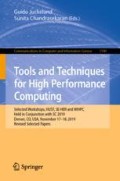Abstract
Advances in mathematical models and numerical algorithms for understanding multiphysics and multiscale phenomena have made software development for simulations a large and complex task. Development and adoption of community codes is one way to address this challenge. The astrophysics community has been ahead of many other science communities in making research codes publicly available and therefore has led the development and adoption of community codes. A study of publicly available software and their penetration in the research conducted by the community can provide important insight for other communities that are facing similar issues. In this paper we analyze software available in Astrophysics Source Code Library, focusing on simulations that include hydrodynamics. We use the citation history of these codes to gauge their impact on the community.
Access this chapter
Tax calculation will be finalised at checkout
Purchases are for personal use only
References
Astrophysics data system. https://ui.adsabs.harvard.edu/
Astrophysics source code library. https://ascl.net/
The GENE Code. http://genecode.org/
SAMRAI structured adaptive mesh refinement application infrastructure. Lawrence Livermore National Laboratory, December 2007. https://computation.llnl.gov/casc/SAMRAI/
Almgren, A.S., et al.: CASTRO: a new compressible astrophysical solver, I: hydrodynamics and self-gravity. Astrophys. J. 715, 1221–1238 (2010). https://doi.org/10.1088/0004-637X/715/2/1221
Baiotti, L., et al.: Three-dimensional relativistic simulations of rotating neutron-star collapse to a Kerr black hole. Phys. Rev. D 71(2), 024035 (2005). https://doi.org/10.1103/PhysRevD.71.024035
Benítez-Llambay, P., Masset, F.S.: FARGO3D: a new GPU-oriented MHD code. Astrophys. J. Suppl. Ser. 223, 11 (2016). https://doi.org/10.3847/0067-0049/223/1/11
Blazewicz, M., et al.: From physics model to results: an optimizing framework for cross-architecture code generation. Sci. Program. 21(1–2), 1–16 (2013)
Bryan, G.L., et al.: ENZO: an adaptive mesh refinement code for astrophysics. Astrophys. J. Suppl. Ser. 211(2), 19 (2014). http://stacks.iop.org/0067-0049/211/i=2/a=19
Burrows, A., Fryxell, B.A.: A convective trigger for supernova explosions. APJ 418, L33 (1993). https://doi.org/10.1086/187109
Colella, P., Woodward, P.R.: The Piecewise Parabolic Method (PPM) for gas-dynamical simulations. J. Comput. Phys. 54(1), 174–201 (1984). https://doi.org/10.1016/0021-9991(84)90143-8. http://www.sciencedirect.com/science/article/pii/0021999184901438
Dubey, A., et al.: Evolution of FLASH, a multiphysics scientific simulation code for high performance computing. Int. J. High Perform. Comput. Appl. 28(2), 225–237 (2013). https://doi.org/10.1177/1094342013505656
Dubey, A., et al.: Extensible component based architecture for FLASH, a massively parallel, multiphysics simulation code. Parallel Comput. 35, 512–522 (2009). https://doi.org/10.1016/j.parco.2009.08.001. http://www.sciencedirect.com/science/article/B6V12-4X54JHJ-1/2/b261a63ad1957b89222e859101236ca7
Dubey, A., Turk, M., O’shea, B.: The impact of community software in astrophysics. In: Onate, E., Olivier, J., Huerta, A. (eds.) Proceedings of WCCM-XI;ECCM-V;ECFD-VI (2014)
Dubey, A., Tzeferacos, P., Lamb, D.: The dividends of investing in computational software design: a case study. Int. J. High Perform. Comput. Appl. (2018). https://doi.org/10.1177/1094342017747692
Hopkins, P.F.: A new class of accurate, mesh-free hydrodynamic simulation methods. MNRAS 450, 53–110 (2015). https://doi.org/10.1093/mnras/stv195
Jordan IV, G.C., et al.: Three-dimensional simulations of the deflagration phase of the gravitationally confined detonation model of type la supernovae. Astrophys. J. 681(2), 1448 (2008). http://stacks.iop.org/0004-637X/681/i=2/a=1448
Janka, H.T., Müller, E.: The first second of a type II supernova: convection, accretion, and shock propagation. Astrophys. J. 448(2) (1995). https://doi.org/10.1086/309604
Menon, H., et al.: Adaptive techniques for clustered N-body cosmological simulations. Comput. Astrophys. Cosmol. 2(1), 1–16 (2015). https://doi.org/10.1186/s40668-015-0007-9
Mignone, A., et al.: PLUTO: a numerical code for computational astrophysics. Astrophys. J. Suppl. Ser. 170, 228–242 (2007). https://doi.org/10.1086/513316
Monaghan, J.J.: Smoothed particle hydrodynamics. Ann. Rev. Astron. Astrophys. 30, 543–574 (1992). https://doi.org/10.1146/annurev.aa.30.090192.002551
Morozova, V., et al.: Light curves of core-collapse supernovae with substantial mass loss using the new open-source SuperNova Explosion Code (SNEC). Astrophys. J. 814, 63 (2015). https://doi.org/10.1088/0004-637X/814/1/63
Müller, B., Janka, H.T., Marek, A.: A new multi-dimensional general relativistic neutrino hydrodynamics code for core-collapse supernovae. II. Relativistic explosion models of core-collapse supernovae. Astrophys. J. 756, 84 (2012). https://doi.org/10.1088/0004-637X/756/1/84
O’Connor, E.: An open-source neutrino radiation hydrodynamics code for core-collapse supernovae. Astrophys. J. Suppl. Ser. 219(2), 24 (2015). https://doi.org/10.1088/0067-0049/219/2/24
Price, D.J., et al.: PHANTOM: a smoothed particle hydrodynamics and magnetohydrodynamics code for astrophysics. Publ. Astron. Soc. Aust. 35, e031 (2018). https://doi.org/10.1017/pasa.2018.25
Springel, V.: The cosmological simulation code GADGET-2. MNRAS 364, 1105–1134 (2005). https://doi.org/10.1111/j.1365-2966.2005.09655.x
Stone, J.M., Norman, M.L.: ZEUS-2D: a radiation magnetohydrodynamics code for astrophysical flows in two space dimensions. I - the hydrodynamic algorithms and tests. Astrophys. J. 80, 753–790 (1992). https://doi.org/10.1086/191680
Teyssier, R.: Cosmological hydrodynamics with adaptive mesh refinement. A new high resolution code called RAMSES. Astron. Astrophys. 385, 337–364 (2002). https://doi.org/10.1051/0004-6361:20011817
Acknowledgements
This material was based upon supported by the U.S. Department of Energy Office of Science, Office of Advanced Scientific Computing Research under Contract No. DE-AC02-06CH11357.
Author information
Authors and Affiliations
Corresponding author
Editor information
Editors and Affiliations
Rights and permissions
Copyright information
© 2020 Springer Nature Switzerland AG
About this paper
Cite this paper
Dubey, A. (2020). A Study of Hydrodynamics Based Community Codes in Astrophysics. In: Juckeland, G., Chandrasekaran, S. (eds) Tools and Techniques for High Performance Computing. HUST SE-HER WIHPC 2019 2019 2019. Communications in Computer and Information Science, vol 1190. Springer, Cham. https://doi.org/10.1007/978-3-030-44728-1_5
Download citation
DOI: https://doi.org/10.1007/978-3-030-44728-1_5
Published:
Publisher Name: Springer, Cham
Print ISBN: 978-3-030-44727-4
Online ISBN: 978-3-030-44728-1
eBook Packages: Computer ScienceComputer Science (R0)

